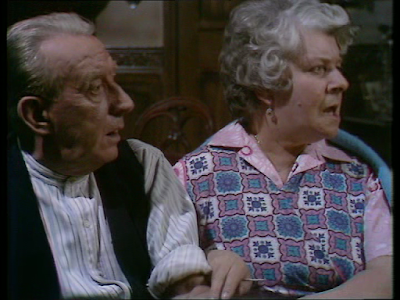I
wonder if, over the course of its 106 episodes, Happy Ever After/ Terry
& June ran through all of the seven basic plots? You would think that
they all turn up at some stage. Terry & June has the
potential to do six of them easily -
1. Cinderella/ The Hero Who Cannot
Be Kept Down - Unrecognised virtue at last recognised.
2. Achilles - The Fatal Flaw.
3. Faust - The debt that must be paid, the fate that catches up with all of us
sooner or later.
4. Tristan - that standard triangular plot of two women and one man, or two men
and one woman.
5. Circe - The Spider and the Fly.
6. Romeo and Juliet - Boy meets Girl, Boy loses Girl, Boy either finds or does
not find Girl: it doesn't matter which.
7. Orpheus - The Quest.
Number six (Romeo and Juliet) is
the only one that seems to be outside it's immediate scope, but perhaps there
might be a suitable story about their children somewhere in Happy Ever After...
I like the idea that it would be possible to teach a
seven-week creative writing/ narrative course exclusively through episodes of Terry
& June.
This one is a Cinderella story (a magical transformation of circumstances) with
a Premium Bond owned by the Medfords winning the month's top prize of £250,000
(which, even taking inflation into account - it would now be just under
£700,000 - seems like a relatively sober figure in a post-Lottery climate. I
see that the top prize Premium Bond is now one million pounds. Which has a
pleasing ring of wealth to it, although being a millionaire isn't exactly what
it once was.)
The situation is certainly set up with
alacrity - Terry gets bills in the post, complains about how they must tighten
their belts, the phone rings with dramatic news. Two sources of dramatic
interest stem from this. It's to be expected that this good fortune must then
be undone in some way - as Terry keeps saying, the Medfords never win anything
and their becoming notably well-off would change the mood of the programme. How
is the fall from paradise going to happen? It keeps the viewer guessing, but
when the reversal happens it's not particularly clever, although at least it's
not completely implausible. John Kane has done some research into how Premium
Bonds work - the disappointment is a variation of the story of the bankrobber
coming out of prison, digging up their loot and discovering that it's no longer
legal tender.
Of greater interest is how this illusory wealth would affect the Medfords. There's
a scene where Terry and June are besieged by petitioners. June's friend Beattie
brings her niece along in the hope of June bankrolling her fashion house. The
vicar brings the church accountant along, hoping for a donation for a new organ
and central heating for the church. A bouquet-bearing Sir Dennis offers Terry a
seat on the Board, and some distant relatives led by an angry George A. Cooper
demand a share of the family good fortune. This is frustratingly skimped on. We
only get to see the first visitors (Beattie and her niece) in the living room,
their offer dismissed with polite steel by June. From them on, we only see
Terry and June greeting the petitioners in their hallway and shepherding them
into the living room... Having gone to the effort of casting so many assorted
characters, it's a shame that we don't then get to see them all crowding into
the room and interacting with each other.
I think that most of
the problems that I've had with this last series could have been solved with
more robust script editing. John Kane was a seasoned old comedy writer who knew
what he was doing, but every episode seems to have a rather thrown away ending
that should have been much stronger.
The two leads are always seriously good, though, something that I didn't
really appreciate watching them as a schoolboy. It must be the combined
training of rep and constantly performing television comedy since the live days
of the fifties that meant that they knew how to make the most of whatever the
series asked them to do.


























